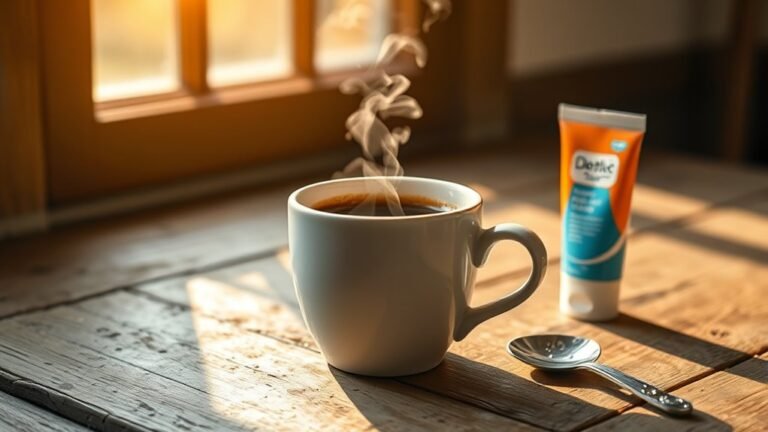Coffee and Anxiety: Understanding the Jitters and How to Cope
Coffee can heighten anxiety by stimulating your central nervous system, leading to jitters and increased heart rate. If you have a predisposition to anxiety, caffeine might amplify your symptoms, so it’s essential to assess your personal tolerance. Gradually reducing your intake can help mitigate withdrawal effects, and exploring alternatives like decaf or tea may also reduce your jitters. Mindful consumption techniques can enhance your coffee experience, making it more enjoyable without the anxiety. You might find more strategies to cope effectively as you explore further.
The Science of Caffeine and Its Effects on the Brain

Caffeine, a powerful stimulant found in coffee, has a significant impact on the brain’s functioning. When you consume caffeine, it’s quickly absorbed into your bloodstream, reaching your brain within minutes. This rapid absorption leads to the release of neurotransmitters like dopamine and norepinephrine, which enhance mood, alertness, and cognitive performance. You may feel more focused and energetic as these chemicals stimulate your brain’s pathways. However, the effects can vary based on individual sensitivity and tolerance. Understanding how caffeine works helps you make informed choices about your coffee consumption, allowing you to enjoy its benefits while maintaining mental clarity. Embracing this knowledge empowers you to balance your caffeine intake and navigate its effects on your life.
How Caffeine Triggers Anxiety Symptoms
While many people enjoy the boost that caffeine provides, it can also trigger anxiety symptoms in some individuals. Caffeine stimulates the central nervous system, increasing heart rate and releasing stress hormones, which can lead to feelings of jitteriness and panic. For those already prone to anxiety, this can amplify existing symptoms. Additionally, caffeine withdrawal can also be a significant anxiety trigger, causing irritability, fatigue, and heightened sensitivity to stress. If you find that your coffee habit is making you feel anxious, consider cutting back gradually to avoid withdrawal symptoms. Understanding how caffeine interacts with your body can empower you to make choices that align with your well-being, giving you the freedom to enjoy life without the jitters.
Identifying Your Caffeine Tolerance

Understanding your caffeine tolerance is essential for managing anxiety and overall well-being. Everyone’s caffeine metabolism differs, so recognizing your limits can help you stay balanced. Here are some tips to identify your personal tolerance:
Recognizing your caffeine limits is vital for managing anxiety and enhancing your overall well-being.
- Start Low: Begin with a small amount of caffeine and gradually increase to see how it affects you.
- Monitor Symptoms: Pay attention to any anxiety or jitters that arise post-consumption.
- Consider Timing: Note how your tolerance changes throughout the day; some may react more strongly in the morning.
- Reflect on Preferences: Acknowledge your individual preferences; what works for one person might not work for another.
The Role of Genetics in Caffeine Sensitivity
Genetics plays a significant role in how you respond to caffeine, influencing everything from your sensitivity to its effects to the speed at which your body metabolizes it. Your genetic predisposition can determine whether you’re a fast or slow metabolizer, affecting how caffeine impacts your anxiety levels.
| Type of Metabolizer | Genetic Influence | Caffeine Sensitivity |
|---|---|---|
| Fast Metabolizer | Specific gene variants | Lower sensitivity |
| Slow Metabolizer | Different gene variants | Higher sensitivity |
| Average Metabolizer | Mixed gene variants | Moderate sensitivity |
Understanding your caffeine metabolism can help you make informed choices about your consumption. By recognizing your genetic traits, you can navigate your caffeine intake more freely and manage any anxiety that may arise.
Strategies to Reduce Caffeine-Induced Anxiety

If you’re feeling anxious after your morning coffee, it’s worth considering some strategies to help manage that response. Limiting your daily caffeine intake can greatly reduce anxiety symptoms, and opting for decaf alternatives might be a smart choice for those sensitive to caffeine’s effects. By making these adjustments, you can enjoy your favorite beverages without the added stress.
Limit Daily Intake
Many people find that limiting their daily caffeine intake can considerably reduce anxiety levels. Establishing a personalized intake helps you maintain energy while minimizing jitters. Here are some strategies to help you set your daily caffeine limit:
- Track Your Consumption: Keep a journal of how much caffeine you consume daily.
- Gradually Reduce: Cut back slowly to avoid withdrawal symptoms, aiming for a manageable decrease.
- Set a Daily Cap: Decide on a maximum amount of caffeine that feels comfortable for you.
- Monitor Your Mood: Pay attention to how your anxiety levels change with different intake levels.
Opt for Decaf Alternatives
For those looking to minimize anxiety while still enjoying the flavors of coffee, opting for decaf alternatives can be a smart choice. Decaf options let you savor the rich taste without the jitters that regular caffeine can bring. Research shows that decaffeinated coffee retains many of the health benefits of regular coffee, including antioxidants that support overall well-being. By switching to decaf, you can enjoy your favorite brews without the heightened anxiety that caffeine often triggers. Additionally, many cafes now offer diverse decaf options, from espresso to cold brew, making it easier than ever to find what you love. Embracing decaf can provide you with a sense of freedom, allowing you to enjoy your coffee ritual without the anxiety that sometimes accompanies it.
Alternatives to Coffee for a Calmer Morning Routine
While coffee might be a go-to for a quick energy boost in the morning, there are several alternatives that can help you start your day with a calmer mindset. Consider these options to ease into your routine:
- Herbal Teas: Chamomile or peppermint can soothe your nerves while providing gentle hydration.
- Morning Smoothies: Blend fruits and greens for a nutritious kick, boosting your mood without jitters.
- Calming Elixirs: Try turmeric milk or adaptogenic drinks that support stress relief and balance.
- Energizing Juices: Freshly squeezed lemon water or energizing juices can offer a revitalizing start.
These alternatives not only promote calmness but also nourish your body, allowing you to embrace the day with clarity and freedom.
Mindfulness Techniques to Manage Jitters

When you feel the jitters from coffee, mindfulness techniques can be a powerful way to regain your calm. Breathing exercises help ground you in the moment, while grounding techniques provide a sense of stability. By incorporating these practices, you can effectively manage your anxiety and enjoy your coffee without the overwhelm.
Breathing Exercises
Although caffeine can heighten feelings of anxiety, incorporating breathing exercises into your routine can greatly help manage those jitters. These simple breathing techniques are effective for anxiety relief and can be done anywhere. Here are four exercises you can try:
- Deep Breathing: Inhale deeply through your nose for a count of four, hold for four, then exhale through your mouth for six.
- Box Breathing: Inhale for four counts, hold for four, exhale for four, and pause for four before repeating.
- 4-7-8 Breathing: Inhale for four, hold for seven, and exhale for eight to promote relaxation.
- Alternate Nostril Breathing: Close one nostril, inhale through the other, switch, and exhale to balance energy.
Try these techniques to regain calm amidst caffeine-induced jitters.
Grounding Techniques
Breathing exercises can be a great way to calm your mind, but grounding techniques offer another effective strategy for managing anxiety, especially those jitters that come from caffeine. Grounding exercises help you reconnect with the present moment and can reduce overwhelming feelings. One simple method is the 5-4-3-2-1 technique, where you identify five things you can see, four you can touch, three you can hear, two you can smell, and one you can taste. This enhances your sensory awareness, pulling your focus away from anxious thoughts. Incorporating these techniques into your routine not only helps alleviate caffeine-induced jitters but also empowers you to regain control over your body and mind, fostering a sense of freedom and calm.
Finding Balance: Enjoying Coffee Without the Anxiety
Finding the right balance between enjoying coffee and managing anxiety can feel challenging, especially since caffeine stimulates the central nervous system. Fortunately, you can savor your coffee rituals without overwhelming jitters by adopting a few strategies:
Finding balance between coffee enjoyment and anxiety management is possible with mindful strategies to reduce jitters.
- Limit intake: Stick to one or two cups a day to reduce anxiety risk.
- Mindful sipping: Take your time to appreciate each sip, enhancing the experience and promoting relaxation.
- Choose lower caffeine options: Consider switching to green tea or decaf for a gentler caffeine experience.
- Stay hydrated: Drink water alongside your coffee to mitigate dehydration, which can heighten anxiety.
Frequently Asked Questions
Can Decaf Coffee Still Trigger Anxiety Symptoms?
Imagine savoring a warm cup, but wondering if even decaf coffee could stir up anxiety triggers. The truth is, decaf isn’t completely caffeine-free; it still contains small amounts that might affect you. For some, this can lead to jitters or heightened anxiety symptoms. If you’re sensitive to caffeine, it’s worth monitoring your response to decaf. Pay attention to how it makes you feel, so you can enjoy your coffee without the anxiety.
How Does Caffeine Withdrawal Affect Anxiety Levels?
Caffeine withdrawal can markedly impact your anxiety levels. As you reduce caffeine intake, you might experience withdrawal symptoms like headaches, fatigue, and irritability, which can exacerbate feelings of anxiety. These caffeine cravings can also create a cycle where anxiety makes you want to consume more caffeine for relief, leading to a temporary boost but ultimately heightening anxiety when the effects wear off. Understanding these dynamics can empower you to manage your caffeine consumption more effectively.
Is There a Safe Amount of Caffeine for Everyone?
Think of caffeine like a dance partner—some lead gracefully, while others stumble. There’s no one-size-fits-all when it comes to a safe amount of caffeine; it all hinges on your individual tolerance and caffeine sensitivity. For some, a morning cup is energizing, while others may feel jittery after just a sip. Listening to your body is essential. Finding that sweet spot allows you to enjoy caffeine without the chaos.
Can Other Beverages Cause Similar Jitters as Coffee?
Yes, other beverages can definitely cause jitters similar to coffee. Certain tea varieties, like matcha or black tea, contain caffeine and can lead to heightened anxiety if consumed in excess. Energy drinks, often loaded with high caffeine and sugar, can also trigger those shaky feelings. It’s important to pay attention to your body and limit these beverages if you notice increased jitteriness. Finding balance is key to enjoying your drinks without the side effects.
What Are Long-Term Effects of High Caffeine Consumption?
High caffeine consumption can lead to several long-term effects, especially if you’ve got caffeine sensitivity. You might experience increased anxiety, disrupted sleep patterns, or even heightened heart rate. Over time, these changes can negatively impact your mental health, leading to chronic stress or mood disorders. It’s crucial to monitor your intake and find what works for you to maintain that sense of freedom and well-being. Balance is key to enjoying caffeine without the drawbacks.






